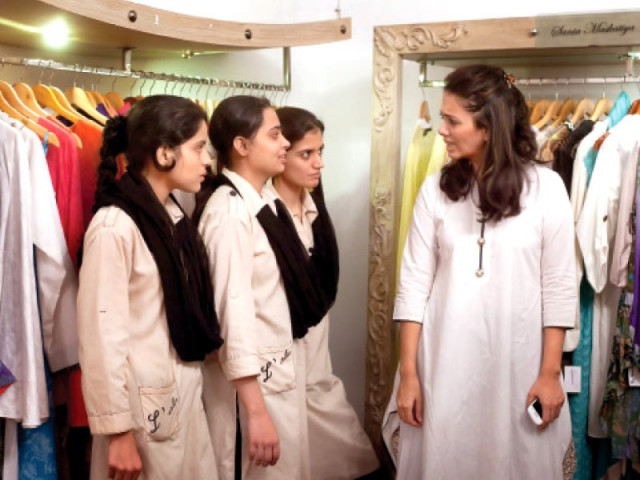
Before Maria leaves for work, she prepares a meal, puts on a child-friendly television channel and hugs her seven-year-old son. She then locks him inside the small rented quarter where they live, quashing her maternal unease as she makes her way to the bus stop for an exacting day of work.
The single mother, 23, is one of 9 million women that have entered the workforce in the last decade, for reasons that have little to do with challenging cultural and religious values. At a pharmacy that employs Maria and a dozen other women, customers are greeted with pleasantries and lured towards mid-range cosmetic brands, where salesgirls pronounce their knowledge of products through small talk about skin types and innovative bristle brushes.

Married off at 16, Maria has little more than a matriculation degree on her resume. With limited career options, she has embraced a marketing job that serves to challenge the label that generally mars women in these fields. Divorced almost three years ago, Maria works eight hours a day to sustain her family. “Women shouldn’t have to depend on anyone for survival,” she said.
Hailing predominantly from lower and middle classes, a large proportion of working women witness contrasting values at their workplaces and houses. Many arrive in burqas and change into contemporary dresses at their workplaces out of fear that full knowledge of their working conditions will at best, hurt their loved ones, and at worst, force them to quit.
In the last decade, Human Resources Consultant Sadia Haroon has conducted 18,000 job interviews. Haroon, who started an HR agency in Karachi, believes that the increase in the female labour force has left a lot of them confused. “Young girls from the lower and lower-middle classes are exposed to a new world when they come to work.”
A parent, husband or brother accompanies a third of female candidates at job interviews, according to Haroon “The trend to trade a career for marriage is more common in upper class women,” said Haroon, adding that few working women can afford such a privilege. Twelve out of 30 female employees return to the job within six months or a year after marriage, she says.

Saira Manzoor is at ease with her job at an upscale clothing retail outlet. At 21, Saira’s plate is full — she works an 8-hour-shift at the store, looks after her brothers and father at home and studies for her upcoming BA exams in her free time. “I was never one to sit idle at home,” said Saira, whose first job was at a call centre. “I feel secure and content in this job,” she explained.
Distrustful of public transport and the harassment that women travelling alone experience, Saira’s father insists on dropping her off in the morning and picking her up in the evening, undaunted by the distance between Bhara Kahu and downtown Islamabad.
Gender anthropologist Dr Huma Haq believes that such jobs tend to be disempowering, with hiring based largely on appearance rather than qualification or skill.
According to the World Bank’s World Development Report, the participation of women in Pakistan’s labour force is at 28 per cent, a clear signal that the battle has just begun. “These women cross the first barrier under compulsion,” said Dr Rakhshanda Parveen, executive director of SACHET, a welfare and development organisation which emerged more than a decade ago with a gender-sensitive outlook.
Parveen views this trend as a force of circumstance that encourages “pseudo empowerment”. “In a selectively traditional society such as ours, the status of these working women does not change within their households, despite the exposure and independence they are privy to while at the job.”
“Women’s empowerment is not an abrupt phenomenon,” stated Naeem Mirza, head of Aurat Foundation, an NGO advocating women’s rights. “It might take longer for these girls to taste empowerment at home, but the economic prospects created by their hard work will ultimately reveal the value of their labour.”
Published in The Express Tribune, August 26th, 2013.


















COMMENTS
Comments are moderated and generally will be posted if they are on-topic and not abusive.
For more information, please see our Comments FAQ